By Henry Owino
Typically, informal settlements, regardless of their location, are often linked to unsanitary conditions and haphazard dumpsites, contributing to environmental pollution. Common pollutants found in such areas include single-use plastic bags (nylon papers), plastic bottles, open sewers, flying toilets, open-air defecation, and various types of waste scattered indiscriminately.
Kibera is no exception to this scenario being the largest urban slum in Africa, located in Kenya’s capital Nairobi. The shantytown hosts a population of approximately a half a million yet without a proper system of waste management.
The waste has always triggered negative impacts to residents, environment and other animals living in such situations. Some of the consequences include; diseases, bad odors, clogged drainage systems, polluted dams and rivers, greenhouse gas emissions contributing to global warming thus climate change among others.
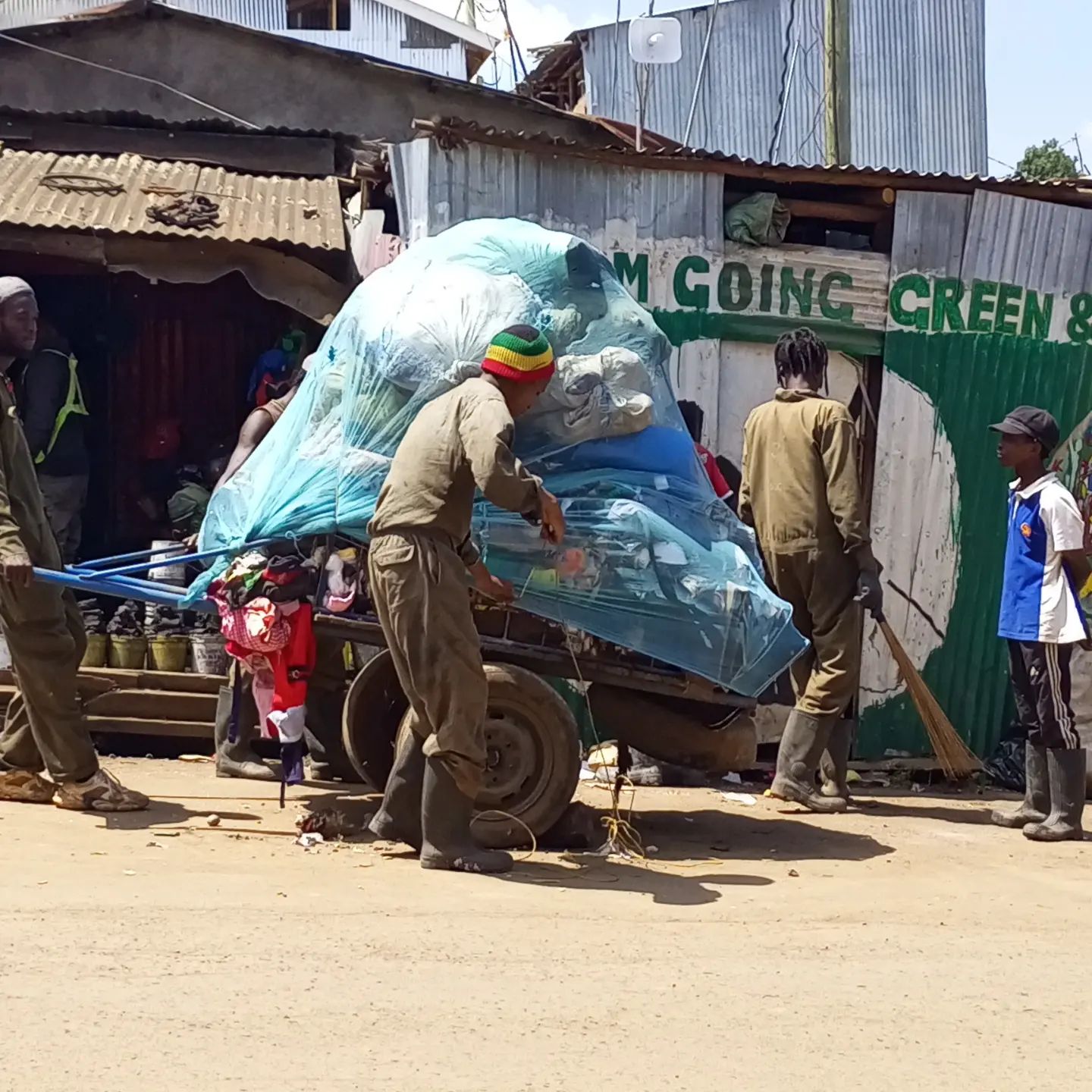
In 2017, the Kenyan government took significant steps to address the issue of waste, particularly plastic waste. A stringent law was enacted to combat plastic pollution, prohibiting the manufacturing, importation, and usage of single-use carrier bags throughout the country. This legislative action was a response to the environmental and health expenses incurred by the government, under the leadership of Judy Wakhungu, who headed the Ministry for Environment and Natural Resources at that time.
At the time of ban, more than 100 million single-use plastic bags were being handed out every year, making them the most commonly used carrier bags for shopping. With poor disposal systems in the densely populated slum, this indicated how the carrier bags posed a major mayhem to the environment.
It is now six years since the policy came into place but the country is still struggling with single-use plastic carriers. Many are easily spotted in open air markets, in waterways and landfills piling up in dumpsites.
Shared Problem
Greenhouse gas emissions from the plastic lifecycle threaten the global community’s ability to keep the planet’s temperature rise below 1.5°C. This is according to a 2019 study by the Centre for International Environment Law.
It is estimated that by 2050, the greenhouse gas emissions resulting from plastic could reach over 56 gigatons, which is between 10%-13% of the entire remaining carbon budget. In 2019, the production and incineration of plastic was projected to produce more than 850 million metric tons of greenhouse gases – that is equal to the emissions from 189 each with five-hundred-megawatt coal power plants.

The issue exacerbates in various slums, not just limited to Kibera, due to inadequate waste disposal practices and high population density. Furthermore, the general population in Kenya displays resistance to change, with many individuals resorting to bribing law enforcement officials to persist in using plastics, as old habits prove difficult to break.
Nairobi’s Kibera slum is just one example in millions of such informal settlements in Africa. Here, plastic bottles are particularly a threat to the environment and residents who have no other choice but to put up with untidiness in their daily lives.
Roseline Amondi aged 60, is a resident and runs business of fried fish and so, popularly known for selling fish in her kiosk (a small open-fronted cubicle). The occupation has since earned her the famous name Mama Samaki meaning; mother who sells fish. She says Kibera is a good place for business especially ready-made food stuff although with challenges of a filthy environment.
“As much as customers are always available to buy fish from my kiosk as a popular fish monger, they are more attracted by the clean environment. So, I always spend time to ensure that my space is tidy by unblocking the drainage system, cleaning it and sweeping the area before opening the business,” Amondi laments.
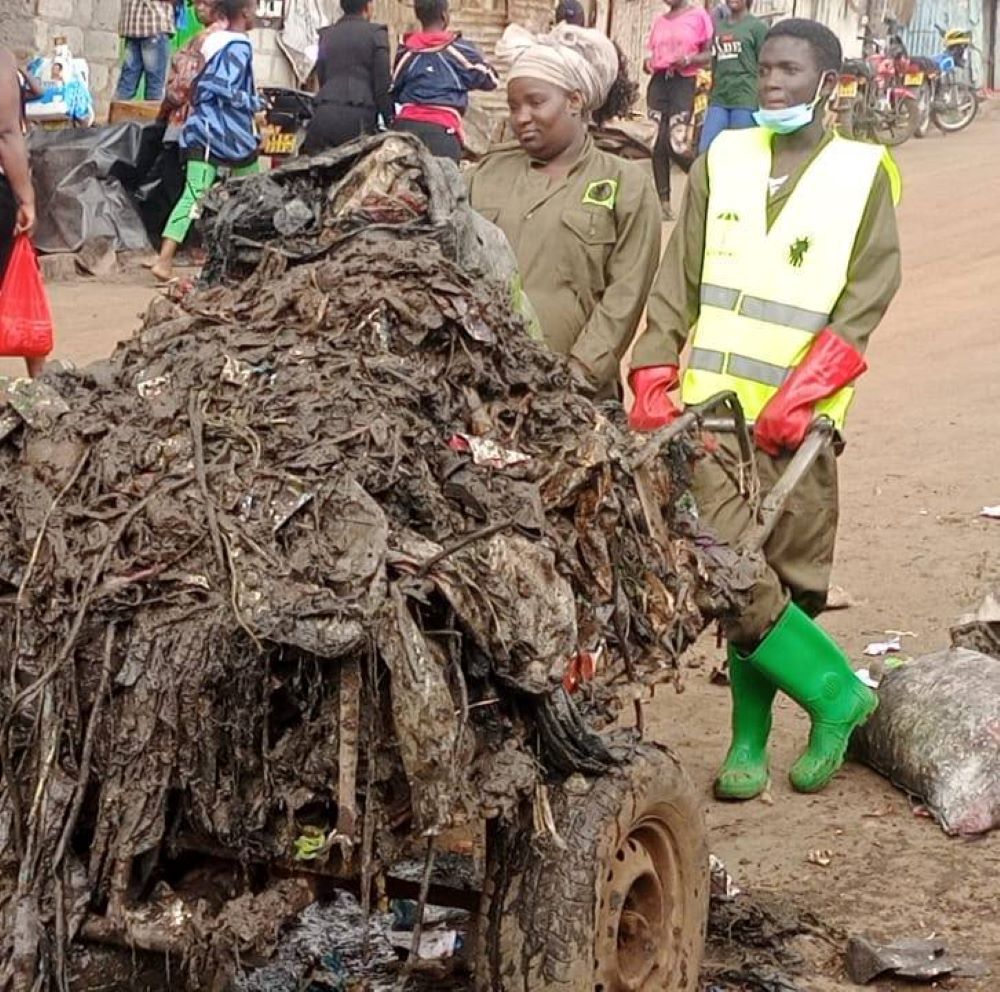
Amondi complains of plastic bottles as the major problem causing sleepless nights to most of business-people. She however, commended a group of youth who have been picking waste and has helped maintain Kibera tidy to date.
“Nowadays I don’t unblock drains each and every single day because there is a group of youth dedicated to cleaning it. I must say they are doing a good job for us here, as far as hygiene is concerned,” she applauded.
Practical Impacts
The youth group is a community-based organization (CBO) dubbed Slum Going Green and Clean (SGGC) that collects waste materials and sells them to various recycling firms. The youth group has been recognized and welcomed by Kibera inhabitants for their good work in the area and residents love their work.
Talk Africa Correspondent patrolled silently in the slum to find out if there was any evidence correlated to the SGGC team. Surprisingly, let the truth be told, the youth group is changing the face of Kibera, the largest urban slum in Africa.
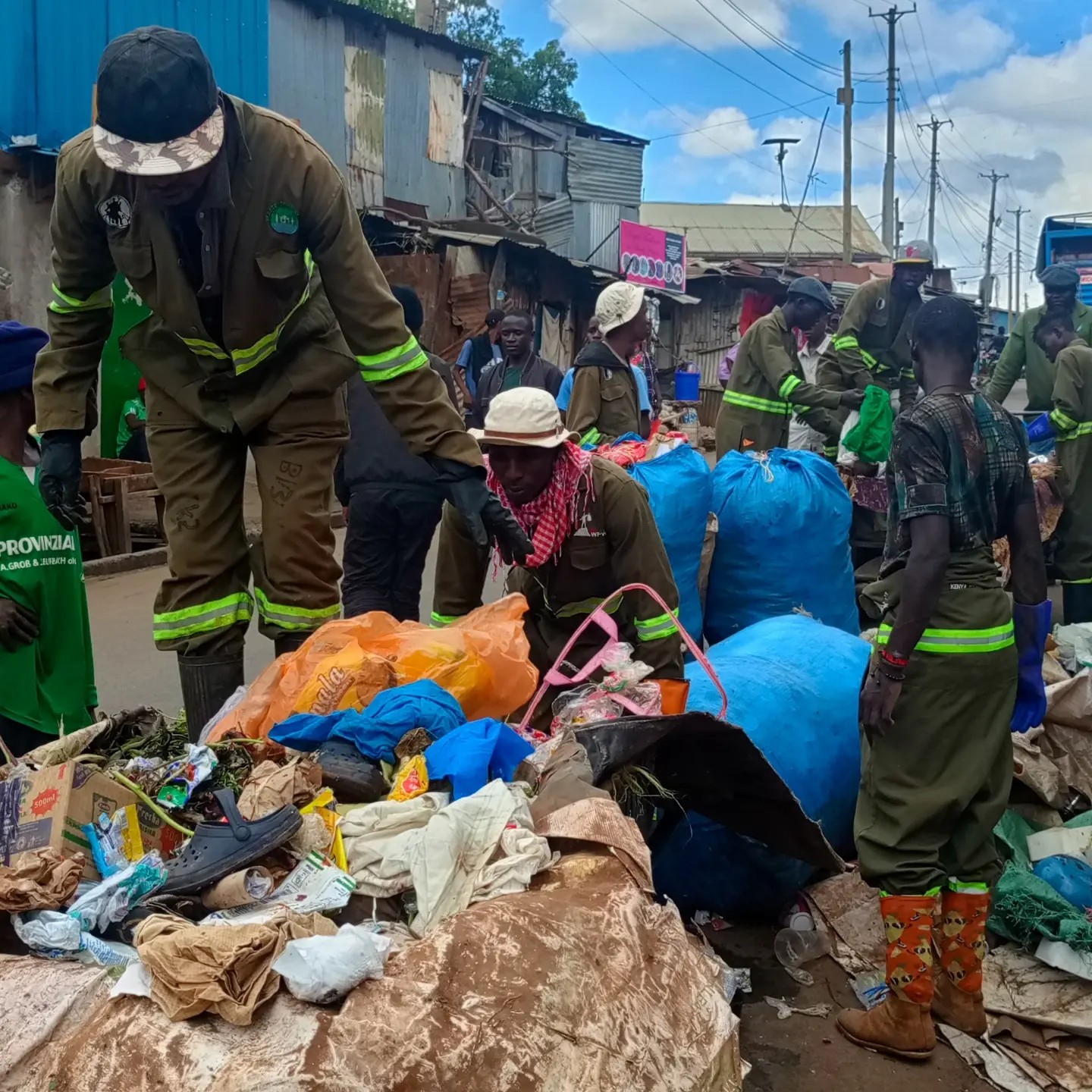
Days of stepping over trash and being careful above head for fear of flying-toilets landing on you are long gone. Apart from the SGGC team who are a well-organized CBO, there are other smaller groups and many individuals who are involved in picking plastic waste and selling it to collectors.
Waste collection has suddenly become gold, in other words the main source of income to jobless women and youth in Kibera. Although it may look quite odd, their pockets have enough money to feed their family, thanks to the circular economy model.
According to Gisore Nyabuti, the SGGC Founder and Team Leader, the initiative began way back in 2015 with few individuals. The aim has been to improve the living conditions in informal settlements such as Kibera by promoting environmental sustainability and cleanliness.
Back in the day, the only policy that existed was to collect waste and transport it to Dandora dumpsite for Nairobi County. The rest of the counties each had its own dumping sites, others with several illegal waste yards.
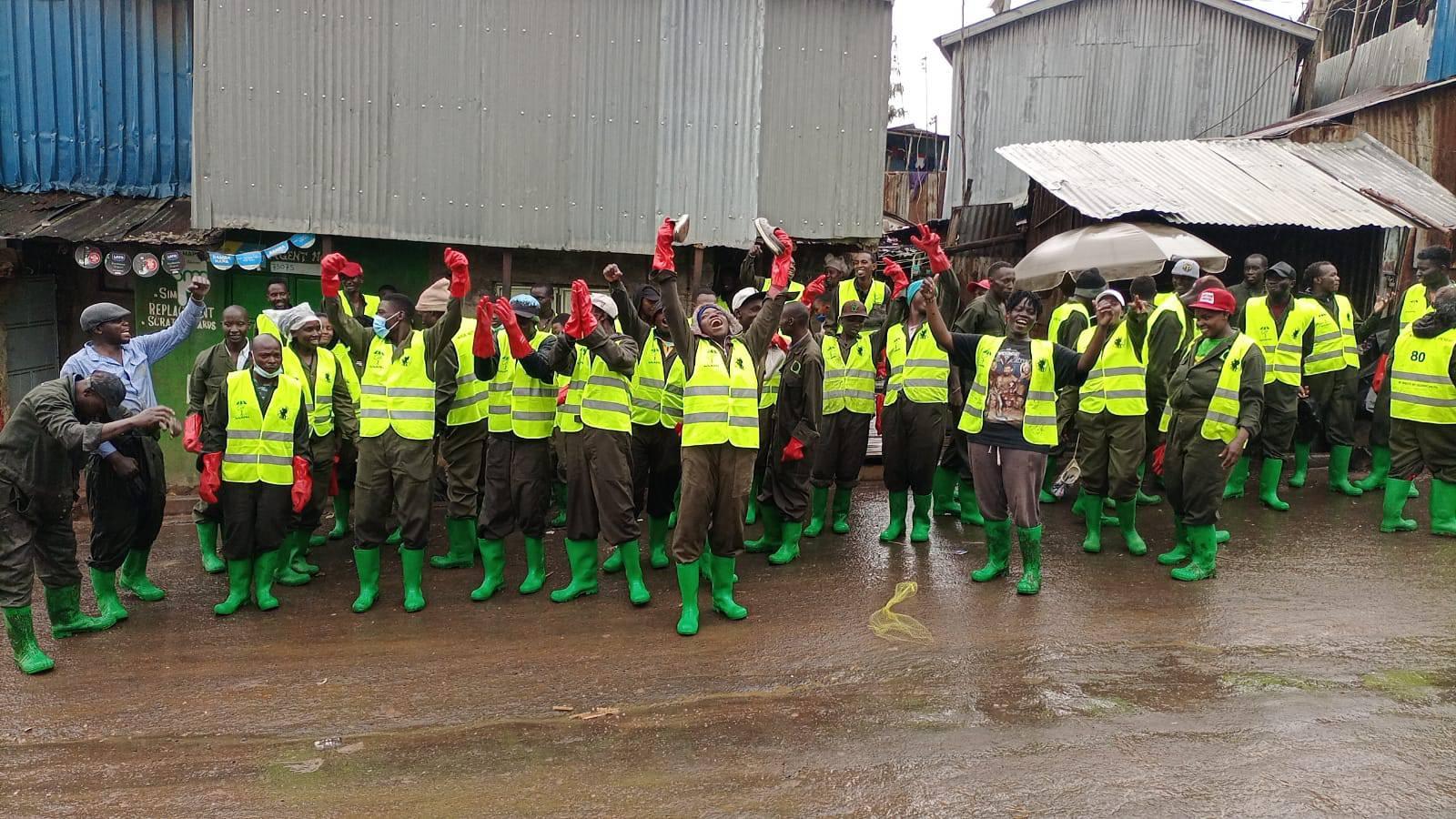
Subsequently, Nyabuti says the organization had activities which have been changing as new policies come in force and they include: Solid waste management where SGGC works to improve waste by promoting recycling, composting, and other waste reduction strategies in collaboration with recycling firms.
Environmental education through conducting educational seminars for community members and schools on topics such as environmental conservation, waste management, and health and hygiene. Improving livelihoods by supporting community members with business skills, training in SMEs developments to help them improve their livelihoods.
Water and sanitation by collaborating with other organizations to improve access to clean water and sanitation in slums, building latrines and community bathrooms and sinking boreholes or wells and Urban Agriculture through encouraging tree planting especially fruit trees and food crops to reduce poverty and hunger among residents.
Circular Economic Model
Nyabuti recalls back at the beginning of SGGC formation, many people brushed him off that it was impossible to clean Kibera slum. But he never lost hope, instead remaining focused with the idea until a few individuals joined him later after seeing the benefits of the work.
“Today membership has grown to about 60 who work in specific villages of Kibera. There are also other waste pickers of approximately 500, majority prefer working on their own but a few collaborate with SGGC team,” Nyabuti explains.
Adding “The Youth have realized that there are no job opportunities in Kenya and instead of involving oneself in criminal activities, they have decided to earn from waste collection. Accordingly, many come and talk to me for membership and I do welcome them regardless of their education background,” Nyabuti discloses.
Nyabuti says SGGC members are mostly youthful who have been today nicknamed; “Environmental Change Makers’ ‘. This is because the team is changing Kibera into green, clean and free from waste pollution. For example, along the railway line that used to be impassable for years even for trains due to illegal dumping, is currently very clean.
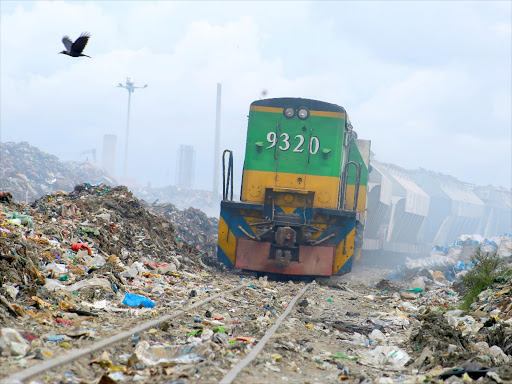
In mid-2022, Mr. Green Africa, a recycling plastic firm, made a collaboration with the SGGC team as plastic waste pickers in Kibera. The partnership has been an opportunity where the company collects waste locally and transports it to recycling firms.
“Our motto is; “No Trash Buried, Burned or Dumped”. The 2022 new policy on waste management has even fulfilled the slogan,” Nyabuti affirmed. Adding; Driving force is the ban of dumping sites countrywide thus advocating for Re-use, Re-duce, Re-cycle.”
Nothing is taken to the dumpsite and nothing is burned or buried as it used to be. All trash is 100% used for making other alternative equipment. Dandora residents are soon going to be reprieve from dumpsite stench and toxic fumes while burning waste releasing greenhouse gasses to the atmosphere.
Waste is Gold
In Kibera, SGGC team have saved many streams, rivers, dams from drying and drainage systems from blocking with all sorts of waste. Plastic bottles have been a menace and the only recycle method available then was linear model where bottles waste were used for liquid soaps, paraffins among other non-edible products.
Currently, the circular economy model has acquainted residents with the innovative method of recycling various plastics. In fact, it has opened up job opportunities for waste pickers while making very high demand for plastics waste. Waste papers such as cartons, books, or old newspapers or documents are the only known to many waste pickers that are recyclable to toilet papers.
Even organic waste and glass bottles that used to be discarded during collections are no longer left behind as its markets for compost fertilizer. Old glass bottles are fused with silica, calcium carbonate and sodium carbonate to make new bottles and save energy.
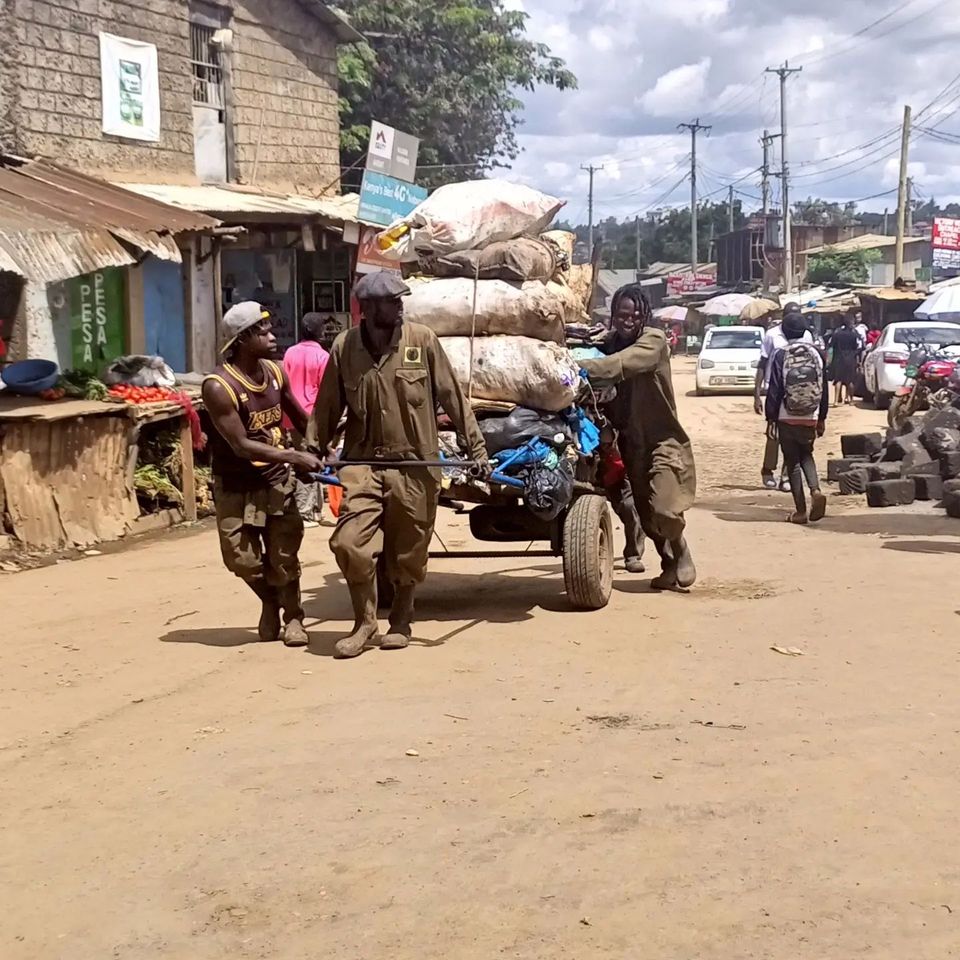
The continuation of demand for various waste is contributing to the process of cleaning the environment from waste pollution. For instance, today, it has restored the railway line to its original clean status, free from all manner of waste.
“With the circular economy model, it requires waste to be segregated, packed according to classification and type, weighed before collectors and transported to recycling firms. No more conglomeration of waste because each waste attracts a different fee as plastics pays highly,” says Angila Onyango, a university graduate but waste picker.
“We usually pick at least a collection of one ton of plastics daily due to other competitors; it could be more. The waste such as papers, electronics may take time but we compost it locally for organic fertilizers,” Onyango adds.
Newton Kilungu SGGC member says the organization continues to expand and the vision is to open a recycling center within Kibera. The anticipation is owing to the quantity of plastics and organic materials they collect and money they pocket in a day.
Kilungu reveals there is a lot of money in waste picking and collection and no losses made apart from gains. People may call them names, underrate them or mistreat them but their pockets are ever deep.
“Waste is not waste until you waste it. Unless you turn waste into a verb, it will remain as a noun”. I mean all the waste we pick is money and none is thrown away as waste,” Kilungu clarifies.
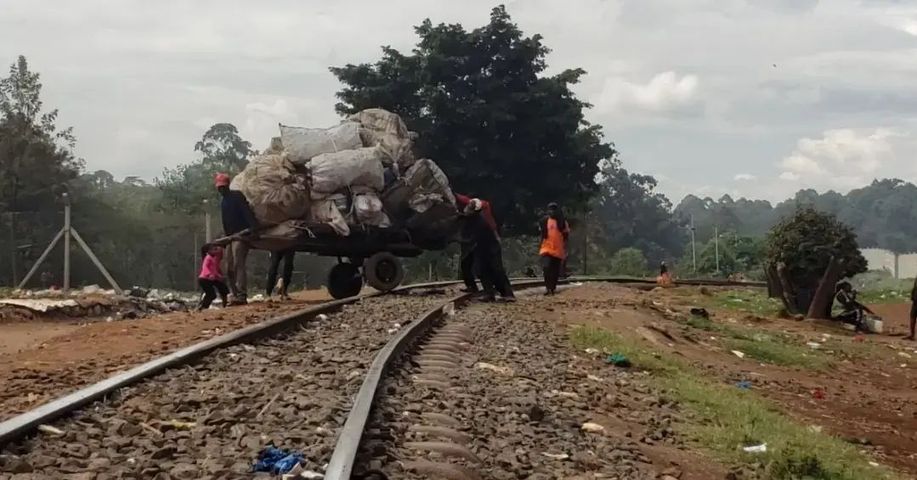
SGGC works closely with the local primary schools in inculcating a waste management attitude as part of an academic programme. The pupils collect plastic bottles from their households and neighborhoods and take them to school in exchange for stationery.
The programme has helped equip pupils with information about environmental waste management thereby changing their attitudes towards littering.
Challenges
Nyabuti reveals that mobilizing the youth in the neighborhood to join the team has not been easy, especially those with a criminal past. Many view the waste pickers as; dirty, hopeless, foolish, senseless, name it, and so would rather stay idle and engage in crime than being a waste picker.
Waste from households usually is not sorted at its source of generation as required by waste management policy, forcing SGGC waste pickers to spend much time segregating the waste. Again, some families are never comfortable with sorting their waste for personal reasons, giving the team the burden of carrying it separately.
Some homes close the entrance to their compounds despite knowing days and times of waste collection. A few perceive SGGC team as thieves who pretend as waste pickers but strategize on plan to steal from them later.
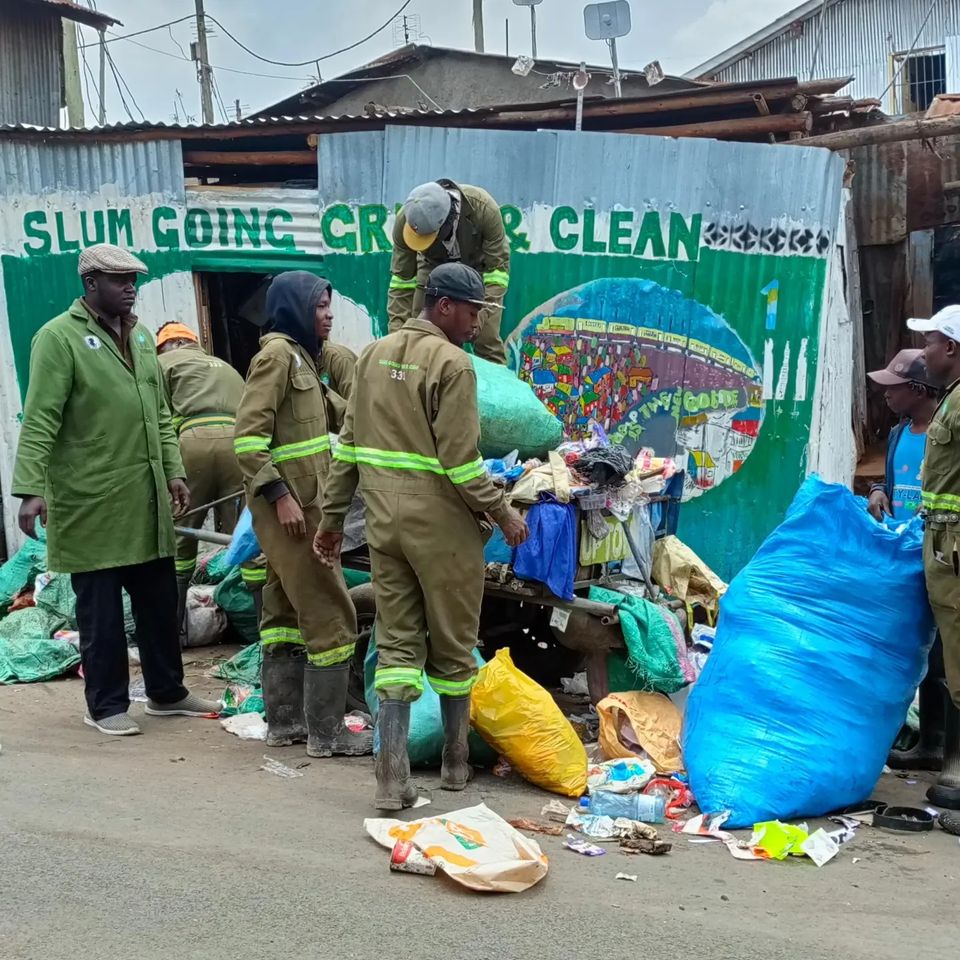
A few customers delay payment of their dues which sometimes end up in exchange of words with the waste pickers. When a customer does not pay outstanding fees on time, waste pickers may not be able to buy personal protective equipment such as gloves, gumboots, masks, overall work suits among other protective garments.
Despite the program’s immense environmental and sanitation benefits to Kibera residents, the SGGC team receives no government support. Waste management is a devolved function that the County Government needs to chip in and support private organizations to make Nairobi’s waste management work.
As much as dumpsite is prohibited under new law, many residents in Kibera still dump their household waste in landfills. In the illegal dumping sites, people throw carcasses, aborted fetuses, flying toilets among other terrifying waste.
Despite all these difficulties, the SGGC team is happy that more and more of the youth are joining them and taking responsibility to change the damage caused to the environment through waste pollution.

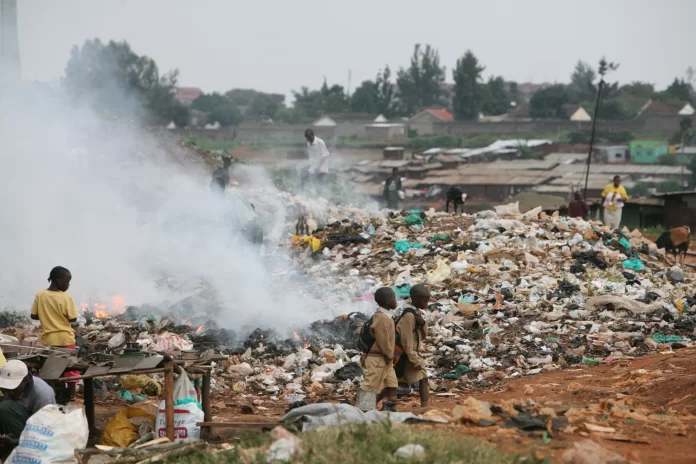













Hello Henry am Gisore Nyabuti good work for posting us and our work just a comment please change the part of aborted fetous flying toilets and carcusses,0797397606 get in touch thank you,
Comments are closed.